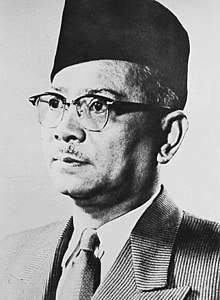Abdul Razak Hussein
Abdul Razak bin Hussein DMN GCMG KStJ (11 March 1922 – 14 January 1976) was the Malaysian politician who served as the 2nd Prime Minister of Malaysia from the resignation of his predecessor Tunku Abdul Rahman in September 1970 to his death in January 1976 for almost 6 years.
Abdul Razak Hussein | |
|---|---|
عبدالرزاق بن حسين | |
.jpg) | |
| 2nd Prime Minister of Malaysia | |
| In office 22 September 1970 – 14 January 1976 | |
| Monarch | Abdul Halim Yahya Petra |
| Deputy | |
| Preceded by | Tunku Abdul Rahman |
| Succeeded by | Hussein Onn |
| 1st Deputy Prime Minister of Malaysia | |
| In office 31 August 1957 – 22 September 1970 | |
| Monarch | |
| Prime Minister | Tunku Abdul Rahman |
| Succeeded by | Ismail Abdul Rahman |
| Member of the Malaysian Parliament for Pekan | |
| In office 20 February 1971 – 14 January 1976 | |
| Preceded by | Parliament suspended |
| Succeeded by | Najib Razak |
| In office 11 September 1959 – 13 May 1969 | |
| Preceded by | Constituency established |
| Succeeded by | Parliament suspended |
| Personal details | |
| Born | Abdul Razak bin Hussein 11 March 1922 Pekan, Pahang, Federated Malay States |
| Died | 14 January 1976 (aged 53) London, United Kingdom |
| Resting place | Makam Pahlawan, Masjid Negara, Kuala Lumpur, Malaysia |
| Citizenship | |
| Political party | |
| Spouse(s) | Rahah Noah |
| Children | 5 (including Najib Razak and Nazir Razak) |
| Education | Bachelor of Laws |
| Alma mater | |
| Profession | Lawyer, secret agent |
| Military service | |
| Allegiance | |
| Branch/service | Askar Wataniah Pahang |
| Years of service | 1941–1945 |
| Rank | Captain |
| Unit | Force 136 |
| Battles/wars | World War II |
Tun Razak was the Prime Minister responsible in setting up Barisan Nasional, which is the ruling coalition of political parties that held power in Malaysia till 10 May 2018, with Barisan Nasional losing the 14th Malaysia General Election under his son Najib Razak, taking over from its predecessor, the Alliance. He is also renowned for launching the Malaysian New Economic Policy (MNEP).
Early life and education
Born in Kampung Pulau Keladi, a village located at northwest of Pekan, Pahang on 11 March 1922,[1] Abdul Razak is the first of two children to Yang DiHormat Orang Kaya Indera Shahbandar ke-9, Dato' Hussein bin Mohd Taib and Datin Hajah Teh Fatimah bt Daud. An aristocratic descent of Orang Kaya Indera Shahbandar, Abdul Razak studied at the Malay College Kuala Kangsar.
After joining the Malay Administrative Service in 1939, he was awarded a scholarship to study at Raffles College in Singapore in 1940. His studies at the college ceased with the onset of the Second World War. During the war he helped organise the Wataniah resistance movement in Pahang.[2]
After World War II, Abdul Razak left for Britain in 1947 to study law. In 1950 he received a law degree and qualified as barrister at Lincoln's Inn in London. During his student days in England, Abdul Razak was a member of the British Labour Party and a prominent student leader of the Malay Association of Great Britain. He also formed the Malayan Forum.
Involvements in World War II
Early WWII and Askar Wataniah
After his studies was interrupted in 1942 because of World War II, Abdul Razak returned to Kuantan, Pahang. He then meets his former colleague from the Malay Administrative Service, Yeop Mahidin and express his interest to join the Malay Regiment (now Royal Malay Regiment). Mahidin, who also the founder of Askar Wataniah Pahang ('Pahang State Territorial Army'; precursor of Rejimen Askar Wataniah) recruited Razak into his new guerrilla forces. After finishing his training under Mahidin, Razak was instructed by Mahidin to join the Japanese Malayan Civil Service as an agent and informant.[3][4]
Informant in Japanese Administration
After finishing his Japanese Military Training, Razak, as an aristocrat and son of a respected Malay leader in Pahang, were posted to his home-state Pahang as an assistant to District Officer and at the same time as a bridge for the Japan to gain trust of local Pahang Malays. Using his privileges as an aristocrat, Razak starts making networking with the Japanese Imperial Forces in the same time maintaining his connection with Yeop Mahidin. His role as an informant inside the Japanese Administration is known only to a few of Wataniah members including Mahidin. Because of this, Razak was labelled as a traitor by the rest of the Wataniah Pahang.[3][4][5]
Force 136 Pahang
At first, the Malays were not fully trusted by the British to fight the Japanese because of few incidents and better treatments by the Japanese Administration towards the Malays if compared to other races. After gaining sufficient trust, the Askar Wataniah Pahang with its 200 members was absorbed into the Special Operations Executive (SOE) and made to Force 136 Pahang.[3][4][5]
The Force 136 Pahang's missions always meet with success made the Japanese Administration began to suspect there is informants inside theirs administration. Force 136 Pahang quickly set up an extraction mission to recover theirs agent, Razak, who is unknown to many of its members.[3][4]
After he had been successfully extracted, Razak continued his work with Force 136 and was promoted to the rank of Captain. Among notable missions, Razak was involved in the rescue of Sultan Abu Bakar of Pahang from MPAJA.[3][4]
Political involvement
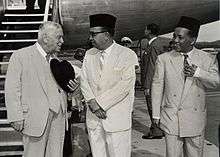
Upon his return from the United Kingdom, in 1950, Tun Razak joined the Malayan Civil Service.[1] Owing to his political calibre, he became the youth chief for United Malays National Organisation (UMNO). Two years later, he worked as the Assistant State Secretary of Pahang and in February 1955, at just 33 years of age, became Pahang's Chief Minister.
Razak stood in and won a seat in Malaya's first general elections in July 1955 and was appointed as the Education Minister. He was instrumental in the drafting of the Razak Report which formed the basis of the Malayan education system. Tun Razak was also a key member of the February 1956 mission to London to seek the independence of Malaya from the British.[1]
After the general elections in 1959, he became the Minister of Rural Development in addition to holding the portfolios of Deputy Prime Minister and Minister of Defence, which he held from 1957.[1] His achievements include formulating the development policy known as the Red Book.
Infusing young blood
At the time of Separation of Singapore from the Federation of Malaysia in 1965, Tun Razak realised that UMNO needed more young leaders in the party. Faced with, amongst other things Lee Kuan Yew's considerable rhetorical skills, Razak wanted young Malay leaders – grounded in their own faith and culture – who would be able to speak and if necessary debate both in the Malay language and English language.
Razak understood that power resided in the Malay community and that for this power to be wielded effectively, the elite among the Malays had to be an elite determined by ability, aptitude and commitment to the nation as a whole. Class, birth and money were secondary in his calculations.
As a consequence of this initiative, the then young leaders of mixed heritage in UMNO, such as Mahathir Mohamad, were drafted into higher echelons of the political establishment.
In 1967 he was awarded the Ramon Magsaysay Award for community leadership.
Prime Ministership
After the 13 May Incident in 1969, Tunku Abdul Rahman Putra received many criticisms from various parties for his inability to deal with racial issues. This led to his resignation as prime minister. Tun Abdul Razak then imposed a State of Emergency, ruling by decree as the National Operations Council until 1970.[1] In September 1970, Tunku Abdul Rahman was succeeded by Tun Abdul Razak as the Prime Minister of Malaysia.
Tun Razak set up the Barisan Nasional or National Front on 1 January 1973 to replace the ruling Alliance Party. He increased the membership of its parties and coalitions in an effort to establish "Ketahanan Nasional" (National Strength) through political stability.
Tun Razak is also renowned for launching the Malaysian New Economic Policy (MNEP) in 1971. He and the "second generation" of Malay politicians saw the need to tackle vigorously the economic and social disparities which fuelled racial antagonisms and violence. The MNEP set two basics goals – to reduce and eventually eradicate poverty, and to reduce and eventually eradicate identification of economic function with race.
Death
Abdul Razak died in office on 14 January 1976[1] while seeking medical treatment in London. He was posthumously granted the soubriquet Bapa Pembangunan ('Father of Development'). He was laid to rest in Heroes Mausoleum (Malay: Makam Pahlawan) near Masjid Negara, Kuala Lumpur.
Awards and recognitions
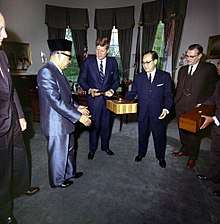
Honours

_-_DMN.svg.png)
_-_SMN.svg.png)
- Tun Abdul Razak was posthumously granted the sobriquet Bapa Pembangunan ('Father of Development').



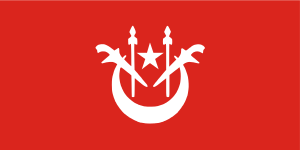



.svg.png)



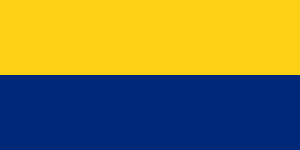








.svg.png)

_-_1._Knight_Grand_Commander_(DP).svg.png)
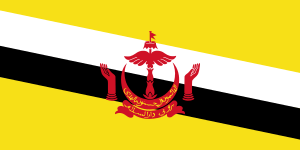



_ribbon_-vector.svg.png)
Things named after him
Several things were named after him, including:
- Tun Razak Highway (Federal Route

- Jalan Tun Razak in Kuala Lumpur (part of Kuala Lumpur Middle Ring Road 1)
- Jalan Tun Abdul Razak in Johor Bahru (part of Skudai Highway)
- Jalan Tun Abdul Razak in Ipoh (also known as Maxwell Road)
- Jalan Tun Abdul Razak in Melaka City (street name for Melaka Bypass)
- Jalan Tun Razak in Kota Kinabalu
- Jalan Tun Abdul Razak in Gowa, Sulawesi Selatan, Indonesia (known as Jalan Hertasning Baru and Jalan Aroepala)
- Jalan Tun Razak in Putrajaya
- Taman Tun Abdul Razak also known as Taman TAR (a residential area in Ampang Jaya, Selangor)
- Bandar Tun Razak in Kuala Lumpur
- Bandar Tun Razak, Jengka in Pahang
- Bandar Tun Abdul Razak, Rompin, Pahang
- Komtar Tower in George Town, Penang
- Komtar JBCC in Johor Bahru, Johor
- Komtar Skywalk in George Town, Penang
- SK Tun Abdul Razak, a primary school in Kuala Kubu Bharu, Selangor
- SMK Tun Abdul Razak, a secondary school in Selekoh, Perak
- Tun Abdul Razak National Secondary School, a secondary school in Kuching, Sarawak
- Tun Abdul Razak Stadium in Bandar Tun Razak, Jengka, Pahang
- Tun Razak Hockey Stadium in Kuala Lumpur
- SK Pusat Penyelidikan Pertanian Tun Razak, a primary school in Jerantut, Pahang
- SMK Pusat Penyelidikan Pertanian Tun Razak, a secondary school in Jerantut, Pahang
- Pusat Penyelidikan Pertanian Tun Razak, a scientific research base in Jerantut, Pahang
- Tun Abdul Razak Research Centre (formerly known as British Rubber Producers' Research Association) in Brickendonbury, England
- KD Tun Abdul Razak, a Scorpène-class submarine of the Royal Malaysian Navy
- Tun Abdul Razak Chancellor Hall (DECTAR) at the National University of Malaysia (UKM) in Bangi, Selangor
- Tun Abdul Razak Library (PTAR) at MARA University of Technology (UiTM), Shah Alam, Selangor
- Tun Razak Library, a public library in Ipoh, Perak
- MRSM Tun Abdul Razak, MARA Junior Science College in Pekan, Pahang.
- Sekolah Berasrama Penuh Integrasi Tun Abdul Razak (SBPITAR), an integrated boarding school in Pekan, Pahang
- Sekolah Dato' Abdul Razak (SDAR), all-boys boarding school in Seremban, Negeri Sembilan.
- Universiti Tun Abdul Razak (UNIRAZAK), a private university in Kuala Lumpur.
- Tun Abdul Razak Residential College, one of residential college in Universiti Malaysia Perlis
- Dewan Tun Abdul Razak, Menara Kembar Bank Rakyat in Kuala Lumpur
- Dewan Tun Abdul Razak, a museum exhibition gallery in Kuching, Sarawak Museum
- Dewan Tun Abdul Razak 1 & 2, Putra World Trade Centre, Kuala Lumpur
- Dewan Kenangan Tun Abdul Razak in Baling, Kedah
- Institut Teknologi Tun Abdul Razak in Petaling Jaya, Selangor
- Institut Teknologi Tun Abdul Razak in Perai, Penang
- Tun Abdul Razak Hockey Cup
- Tun Abdul Razak Heritage Park, a public recreational park in Kuala Lumpur
- Tun Abdul Razak Memorial, a memorial in Kuala Lumpur
- Kem Tun Razak, a military camp in Bayan Lepas, Penang
- Tun Razak Chair at Ohio University's Department of Southeast Asian Studies
- Tun Razak Exchange
- SBK20 Tun Razak Exchange MRT station in Kuala Lumpur
- Tun Razak Tower in Kuala Lumpur
- Kolej Tun Abdul Razak, a residential college at Universiti Malaysia Perlis, Arau, Perlis
- Kolej Tun Abdul Razak, a residential college at Universiti Teknologi MARA, Bukit Besi, Terengganu
- Kolej Tun Razak, a residential college at Universiti Teknologi Malaysia, Skudai, Johor
In popular culture
Motion picture & television
- Malaysian actor Zaefrul Nordin played Razak in 2007 film 1957: Hati Malaya
- FFM Award Winning actor Rusdi Ramli portrayed Razak in 2013 film Tanda Putera and won his second FFM for Best Leading Actor.
Stage/Theatre
- FFM nominee Rashidi Ishak portrayed Razak in 2009 local theatre production Tun Razak in Istana Budaya.
References
- Hoiberg, Dale H., ed. (2010). "Abdul Razak bin Hussein, Tun Haji". Encyclopædia Britannica. I: A-ak Bayes (15th ed.). Chicago, Illinois: Encyclopædia Britannica Inc. pp. 21. ISBN 978-1-59339-837-8.
- "1967 Ramon Magsaysay Award for Community Leadership – Tun Abdul Razak". Archived from the original on 10 October 2007. Retrieved 17 August 2007.
- "Tun Razak, The Malaysian 'James Bond' And His Early Years As A Soldier Spying On Japanese Invaders". Malaysian Digest. 31 July 2017. Archived from the original on 4 July 2018.
- Liew, Shan Lee (24 January 2014). "Tun Abdul Razak - The Hidden Story". The Malaysian Patriot.
- "Force 136 dan Komunis". The Patriots (in Malay). 14 July 2017.
- "Senarai Penuh Penerima Darjah Kebesaran, Bintang dan Pingat Persekutuan Tahun 1976" (PDF).
- "Senarai Penuh Penerima Darjah Kebesaran, Bintang dan Pingat Persekutuan Tahun 1959" (PDF).
- "No. 44404". The London Gazette. 8 September 1967. p. 9801.
External links
| Wikimedia Commons has media related to Abdul Razak Hussein. |
- Tun Razak’s legacy – his vision, The Star, 2 March 2008.
- The band of brothers C. S. TAN, The Star, 2 March 2008.
| Political offices | ||
|---|---|---|
| New office | Deputy Prime Minister of Malaysia 1957–1970 |
Succeeded by Ismail Abdul Rahman |
| Preceded by Abdul Rahman |
Prime Minister of Malaysia 1970–1976 |
Succeeded by Hussein Onn |
